The 10 best cloud storage apps in 2023
Phone storage maxed out? Computer hard drive slower than molasses going uphill? Before mindlessly upgrading your iCloud or Google Drive cloud storage because you literally can't even, there are other options.
But there are so many cloud storage apps these days. How do you choose? The best one for you comes down to a lot more than price and gigabytes. It's about features, yeah, but it's not just a data connection, it's a soul connection. The on-the-go creator? The HIPAA-compliant counselor? The 500-photos-a-day-er? The family with 700 devices? The new remote team? The digital hoarder who wants a backup of their backup's backup? (Three cheers for redundancy!)
Whether it's your first time ditching diskettes or you're already accumulating in the cumulus, there's a cloud storage app meant for you right here.
I spent weeks testing dozens of cloud storage options, and based on my experiences with them, I'm here to tell you which one is best for which type of soul.
The 10 best cloud storage apps
Google Drive for Android and Google Workspace users
iCloud for Apple users
Dropbox for low-maintenance syncing
Box for unlimited storage
OneDrive for Windows and Microsoft 365 users
Sync for Canadians
Proton Drive for privacy
Zoho WorkDrive for a Google Drive alternative
Jottacloud for automatic, unlimited photo storage
Koofr for managing multiple cloud storage providers in one interface
What makes the best cloud storage app?
How we evaluate and test apps
All of our best apps roundups are written by humans who've spent much of their careers using, testing, and writing about software. We spend dozens of hours researching and testing apps, using each app as it's intended to be used and evaluating it against the criteria we set for the category. We're never paid for placement in our articles from any app or for links to any site—we value the trust readers put in us to offer authentic evaluations of the categories and apps we review. For more details on our process, read the full rundown of how we select apps to feature on the Zapier blog.
Based on decades of digitally storing my work and life stuff, these five features are what I think matter most for good cloud storage software:
Amount of storage. More = better? There's more to it than that, including monthly transfer limits, the types of files you're allowed to store, and how shared storage buckets are divvied up.
Competitive pricing. Cheap isn't always cheap. It's tempting to go with the app offering the most GBs for the least dollars, but why pay for more storage than you need when you could be getting features that save time instead?
Offline and multi-device access. You have to be able to access your stuff when and where you want it, on all your devices in all locations—from the loo to lost in the woods.
Organization tools. The best cloud storage platforms offer organization tools that either mimic your OS's folder structure, or make it equally easy to sort, filter, search for, and organize your files.
Security and reliability. You have to keep those banking passwords, social security numbers, and crypto wallet codes secure, right? Just kidding: please don't keep those in cloud storage. But for most people, security is second only to price, and for good reason: your stuff is your stuff, and you want to keep it that way.
Is there one cloud storage platform to rule them all? In short, no.
As a freelancer, I need secure storage and backup for all my work, and an easy way to pick up where I left off on any device when a new pun strikes. And as a mom and dog owner, I need nearly unlimited storage for the hundreds of daily photos of my little loves.
I've tried my fair share of cloud storage services over the years, and to write this article, I tested dozens more that I'd never heard of before. Besides judging each of them against the five features above, I'm using my decades of experience storing my stuff in everything from chunked FTP uploads to the world's first consumer cloud storage app to evaluate what each of these apps does best.
But first, there's one exception I'll get out of the way: Adobe Creative Cloud.
It's a cloud, sort of, and it's storage, sort of. Adobe Creative Cloud makes working across the Adobe family of apps seamless across devices. It stores your files, asset libraries, purchased templates, stock photos, and more.
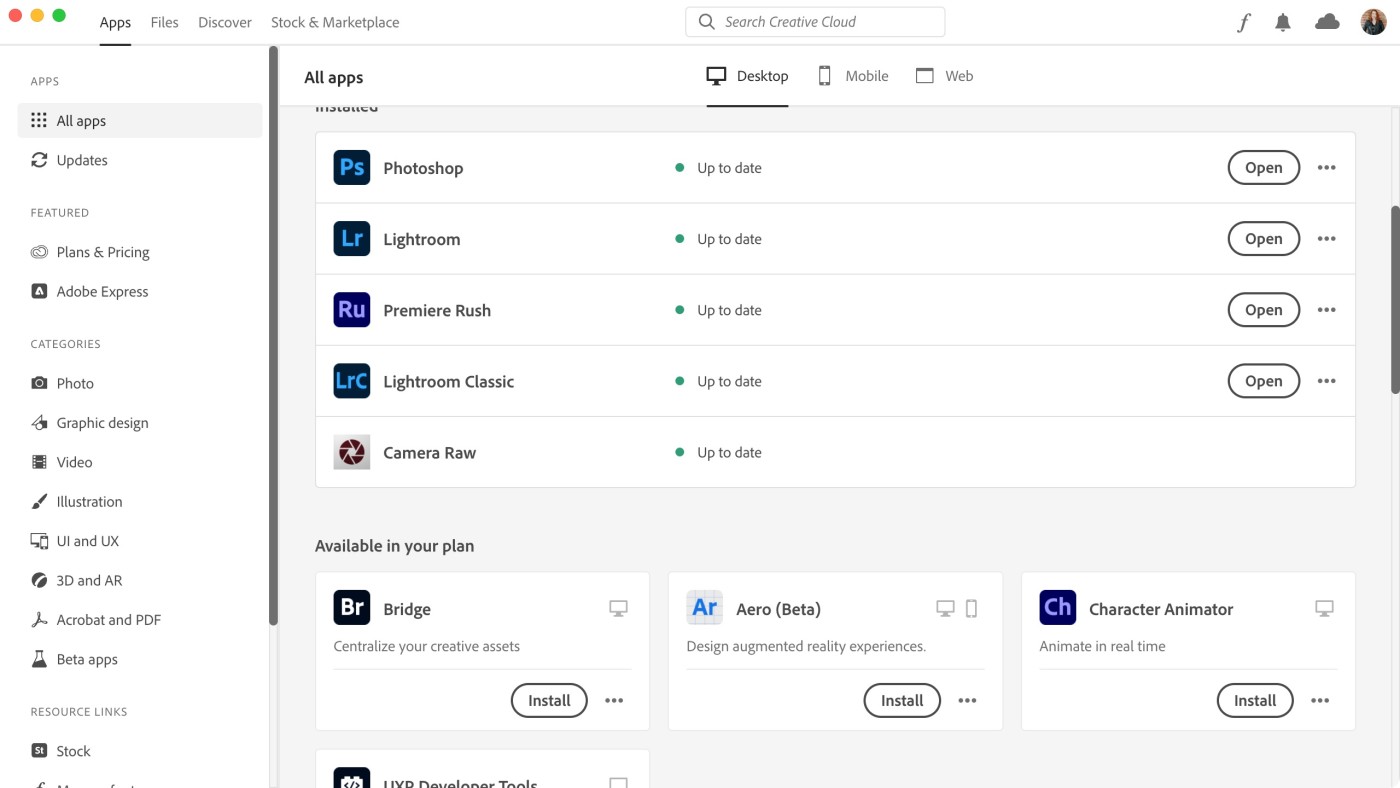
Creatives on-the-go can edit photos in Lightroom on their phone while commuting, then continue their work on the big screen when they get to the office. It's only available on Adobe software subscription plans, making it a niche service for creative professionals instead of an all-around cloud storage solution.
Ok, now onto the rest of the cool cloud crowd.
Best cloud storage app for Android and Google Workspace users
Google Drive (Windows, Mac, iOS, Android, Web)

Google has been big on the cloud storage scene since the early '00s, at the time competing against soon-to-be-defunct Amazon Drive. I've used Google Drive for almost a decade to store everything, including automatic photo backups with Google Photos, which works on both Apple and Android devices. Plus, if you use Google Docs or other Workspace apps, you need to keep them in Google Drive.
Google makes it easy to optimize hard disk space on your device. You can choose to "stream" or "mirror" your files. Streaming means you need to be online to view them. Mirroring means your files live on both your computer and the cloud, so you can access them anytime, even offline, and they sync when you're online. I mix the two: choosing streaming for large folders I don't need often, and mirroring for things I want to be able to access anytime.
True story: I recently went to work at a coffee shop, and they didn't offer Wi-Fi. But it wasn't a problem, thanks to mirroring my important work files and turning on offline editing in Google Docs. (But still, wow.)
Something I appreciate about Google Drive vs. its main rival iCloud is the ability to connect third-party apps. For example, I back up my physical network-attached storage (NAS) drives to Google Drive using Synology Cloud Sync.
I keep using Google Drive because it's necessary for my work documents, easy to use, and an effortless—though not the most cost-efficient—way to back up my NAS drives. (More on this later.) For most people, Google Drive ticks all the boxes.
For more flexibility, connect Google Drive to thousands of different apps with Zapier. Personally, I manage my tasks with Todoist and store my work in Google Drive. Each client project gets its own folder, and with this Zap (automated workflow), making that folder automatically adds a new task in Todoist for me. Tres efficient.
But you can create Zaps for just about anything to make the most of Google Drive. Here are some other examples.
Google Drive pricing: Get 15GB for free. Drive storage alone: $1.99/month for 100GB, $2.99/month for 200GB, $9.99/month for 2TB. Google Workspace: $6/month for 30GB, $12/month for 2TB, $18/month for 5TB.
Learn more: 5 ways to automate Google Drive
Best cloud storage app for Apple users
iCloud (Mac, Windows, iOS, Web)
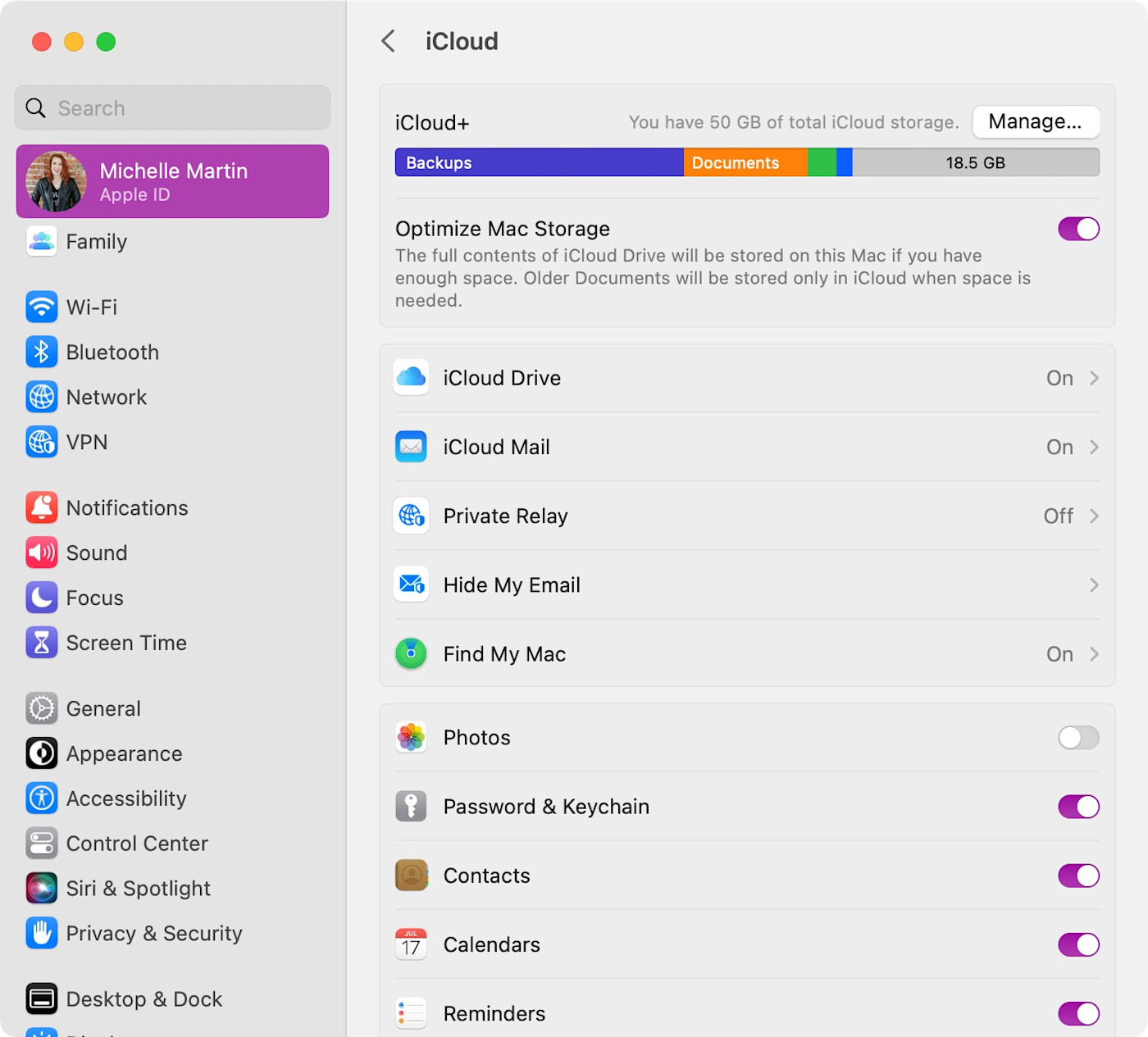
Before you think I'm being too tough on Apple fans, know that I am you. I'm writing this on my MacBook beside my iPad with my iPhone in my pocket.
Besides its competitive pricing, the biggest reason to use iCloud is that it's so seamless with Apple devices. iCloud also backs up my phone, iPad, and my son's iPad without me having to do anything. Drop my phone in the ocean? No problem—I've got my stuff, including all those pricey apps I've collected over the years.
Of course, iCloud backup has benefits for Apple, too: it makes it ridiculously easy to upgrade your device. Last year, I upgraded all three of my Apple devices, and each time, iCloud transferred all my apps, files, and settings in less than an hour, so everything was the way I liked it, right away. The convenience factor is highly appealing for users and profitable for Apple.
As a cloud storage solution, iCloud is built in to all Apple devices (no apps to install or update ever!), and it runs quietly in the background, syncing to perfection and never bothering you with a notification of any kind. So if you want capable cloud storage that you never need to deal with, and you know you're going to keep buying Apple devices, iCloud is the one for you.
iCloud pricing: Get 5GB for free. $0.99/month for 50GB, $2.99/month for 200GB, $9.99/month for 2TB. Family sharing plans for up to 6 users are $3.99/month for 200GB and $12.99/month for 2TB.
Best cloud storage app for low-maintenance syncing
Dropbox (Mac, Windows, iOS, Android, Web)

Dropbox offers many competitive features in its premium plans, including family sharing, a built-in password manager, and remote data wipe options in case of device theft.
But in my opinion, the biggest reason to use Dropbox is that it just works. Whether you're on Mac or Windows, the unobtrusive app runs automatically in the background. I've used the free plan for almost 10 years and have never run into a syncing or offline file access issue.
I also find Dropbox easier for sharing files with others. While Google Drive and others allow sharing, I sometimes get that syncing—er, sinking—feeling of, "Am I sharing this file...or the entire folder?" Dropbox's folder icons make it easy to tell at a glance what's shared and what isn't.
While its free storage quota is small, it's more than enough for documents or sharing your annual folder of tax crap with your accountant. For photographers and other creative professionals, Dropbox's paid plans include in-app watermarking for sharing visual work with clients, which may be worth the upgrade for you.
If you're looking for a simple cloud storage app that's easy to use above all else, or you want to share a storage bucket with multiple non-Apple users, Dropbox is the one for you.
Dropbox also works with Zapier, so you can automatically save forms, email attachments, update other apps, and much more. My personal favorite Zap is saving Notion database attachments to Dropbox, but there are nearly infinite options.
Dropbox pricing: Get 2GB for free. $11.99/month for 2TB or $19.99 for 2TB split between up to 6 users. Various business plans start at $54/month for 3 users and 5TB.
Take a look at 3 ways to keep your Dropbox organized—automatically.
Best cloud storage app for unlimited storage
Box (Mac, Windows, iOS, Android, Web)
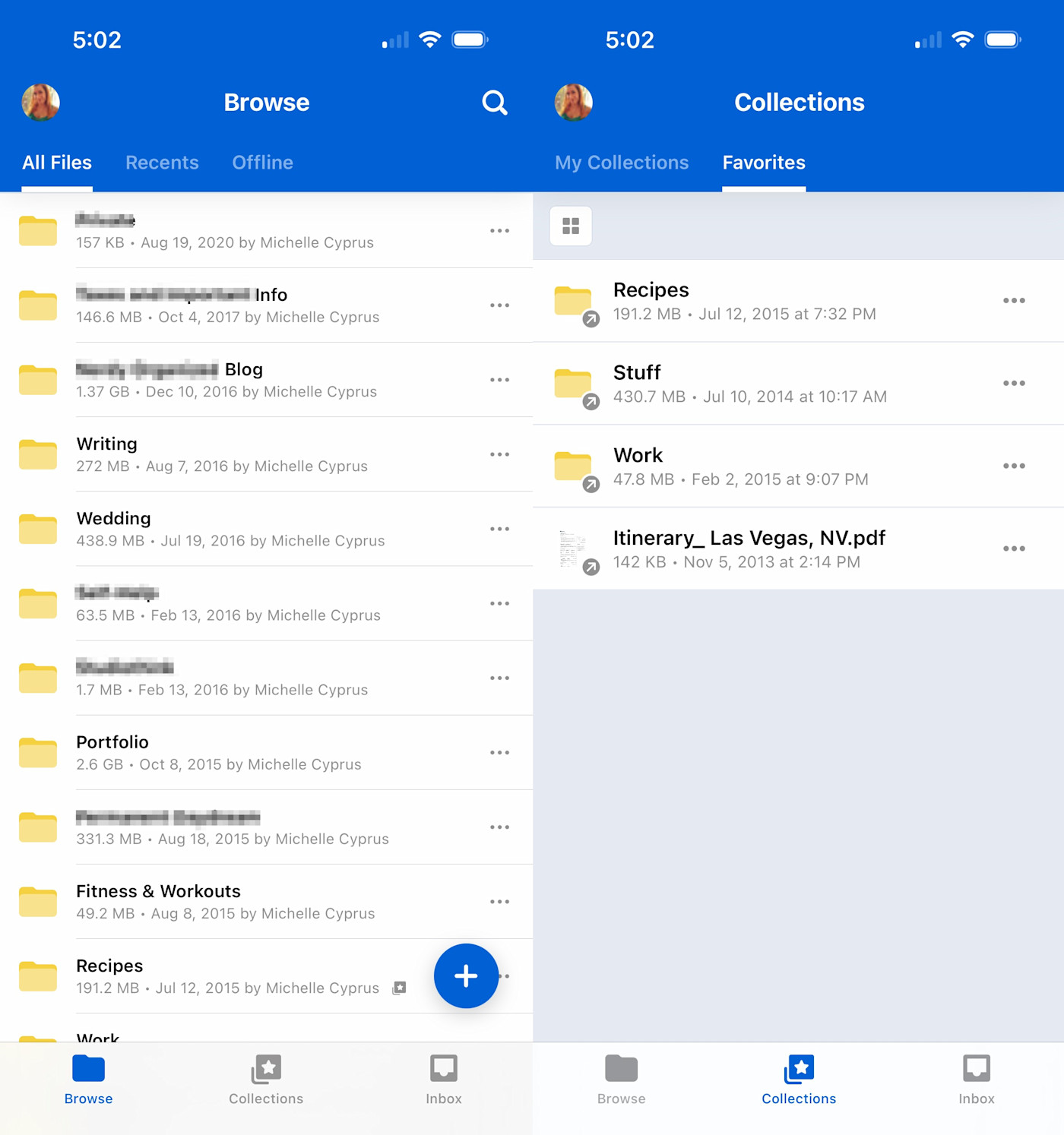
*Gasp* Unlimited? Yes, although unlimited in the way some restaurants say "all you can eat," which is—to re-live an early formative experience—actually quite limited.
And like the day I was informed a 12" chocolate cake wasn't on the unlimited menu, Box's basic unlimited storage plans cap you at 5GB per file. That's enough for most needs, but probably not enough if you plan to backup videos, since iPhones now record 6GB per minute of 4K video. Higher Box tiers allow up to 150GB per file, but there are more cost-effective apps at that price point.
Box has a lot going for it, though. I find its mobile app the easiest to use of all. The Favorites and Collections tabs allow you to quickly access key files or folders on mobile, without interfering with your directory structure anywhere else.
Editing Box Notes (text files) on mobile is quick and easy, making it a great on-the-go notes solution that automatically syncs across devices. File comments are easy to read and reply to, making collaboration a breeze anywhere. Box also offers Canvas, a virtual whiteboard that's great for personal or team brainstorming.
Those features, combined with Box Sign for document signatures, make Box a strong contender for freelancers and small businesses—as long as you don't need to store a lot of video or large, individual files.
Box also integrates with Zapier, allowing you to automate tasks like emailing files directly to your Box storage or keeping your remote team in the loop when you add new resources.
Box pricing: Get 10GB for free. Plans range from $14/month for 100GB to $60/month (minimum 3 users at $20/each) for unlimited storage with a Business account.
Best cloud storage app for Windows and Microsoft 365 users
OneDrive (Mac, Windows, iOS, Android, Web)

OneDrive just makes sense for Microsoft Office users to work on your Word, PowerPoint, and other files anywhere. Deep integration with Windows makes it convenient, but it works well on Mac and iOS, too. The desktop, web, and mobile apps are all well-organized. Its pricing is right in line with iCloud too.
Perhaps even more important to some users, so is its newly redesigned Photos tab, which automatically organizes your photos into categories like screenshots and selfies, and displays everything in an aesthetically pleasing gallery—just like Apple Photos.
So what's exciting about OneDrive? Not much.
Other apps are launching whiteboarding tools and custom branding, and OneDrive is just… storing your stuff. But sometimes, the best apps are the ones that do their one job well. And OneDrive does storage well, with the reputation of Microsoft behind it. For Office and Windows users, it's a no-brainer. For everyone else, it should be a strong contender based on its reliability and ease of use.
Plus, OneDrive connects to Zapier, so you can run automations like the ones I've mentioned before, or use Zapier to improve cross-platform compatibility. Want to use Google Docs but not Google Drive for storage? Store them in OneDrive.
Or connect OneDrive to any of the other apps you use (including other cloud storage apps).
OneDrive pricing: Get 5GB for free. Paid plans are $1.99/month for 100GB, $6.99/month for 1TB, $9.99/month for 6TB (shared with 6 users, split 1TB each).
Best cloud storage app for Canadians
Sync (Mac, Windows, iOS, Android, Web)
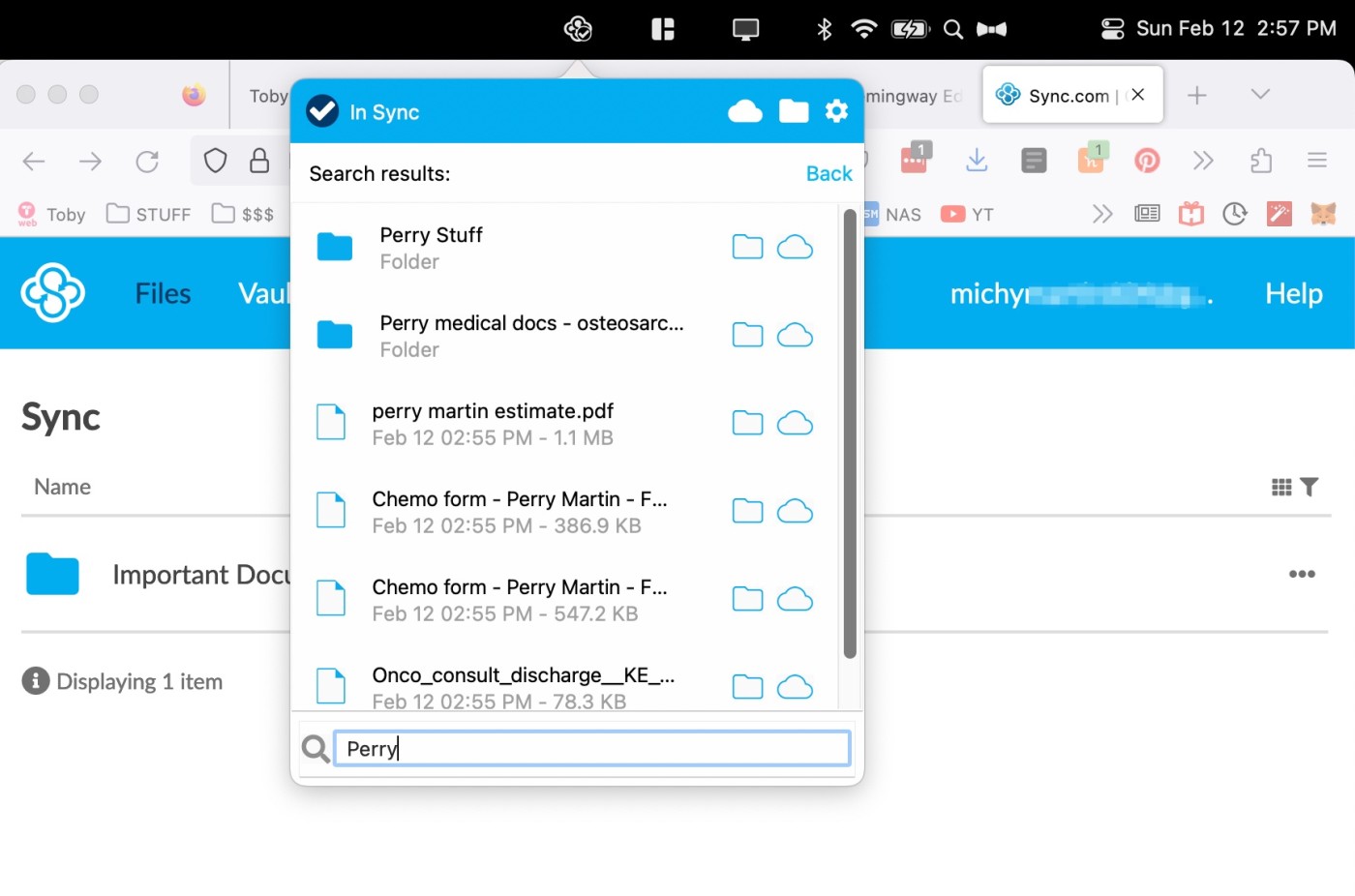
Storage, syncing, yada yada yada—Sync works. I also especially like the quick search right from the menu bar. But what I really want to talk about is the law and the wild, wild West.
Whether you're Canadian or not, Sync is an affordable choice for freelancers or remote teams who plan to operate worldwide with built-in compliance for GDPR, HIPAA, and PIPEDA privacy laws and support for Microsoft Office 365 document editing. Sync provides unique privacy protection for Canadian individuals, too.
Fellow Canucks, strap on your tinfoil toque 'cause this is where things get syrupy.
Canadian businesses, including self-employed individuals, must protect customer data under PIPEDA, and that doesn't mean only from hacking attempts by ne'er-do-wells. In 2022, Canada's privacy office found a popular coffee chain's app violated PIPEDA in two ways: first, collecting too much user data, and second, its contract with an American third-party data processor was "vague and permissive." Even accidentally misplacing one customer's physical or digital information or failing to notify customers of a suspected data breach is enough to face fines up to $100,000. International companies are also subject to PIPEDA if Canadian customer data is affected by a breach.
Who cares? I just want to store my stuff, right? Well, these laws matter for privacy-focused individuals, too.
American authorities have always been able to force tech companies to turn over data on servers located within the U.S. That's why data residency is a thing. As long as your data was on a server elsewhere—for example, Canada—it was safe from the men in black. Now, data residency isn't enough: 2018's CLOUD Act extended authorities' access to servers outside the United States if the storage company is U.S.-based. Which is essentially everyone: Apple, Google, Dropbox, Microsoft…
The CLOUD Act is meant to speed up criminal investigations, not for the FBI to read your secret Beanie Baby wishlist. But isn't the road to privacy violation often paved with the best intentions?
For freelancers or businesses, the fact remains that under PIPEDA, you're responsible for protecting your customers' data from third-party access. Thanks to the CLOUD Act, using an American-owned cloud storage app could lead to a potential violation.
There's only one way to ensure 100% compliance with Canadian privacy laws, or protect your personal privacy: storing with a Canadian-owned company exempt from the CLOUD Act, such as Sync. Take it out for a rip there, bud!
Sync pricing: Get 5GB for free. $8/month for 2TB, $20/month for 6TB, or get unlimited storage for $30/month on a Team plan (2 users minimum at $15/month each). Prices in Canadian dollars.
Best cloud storage app for privacy
Proton Drive (iOS, Android, Web)
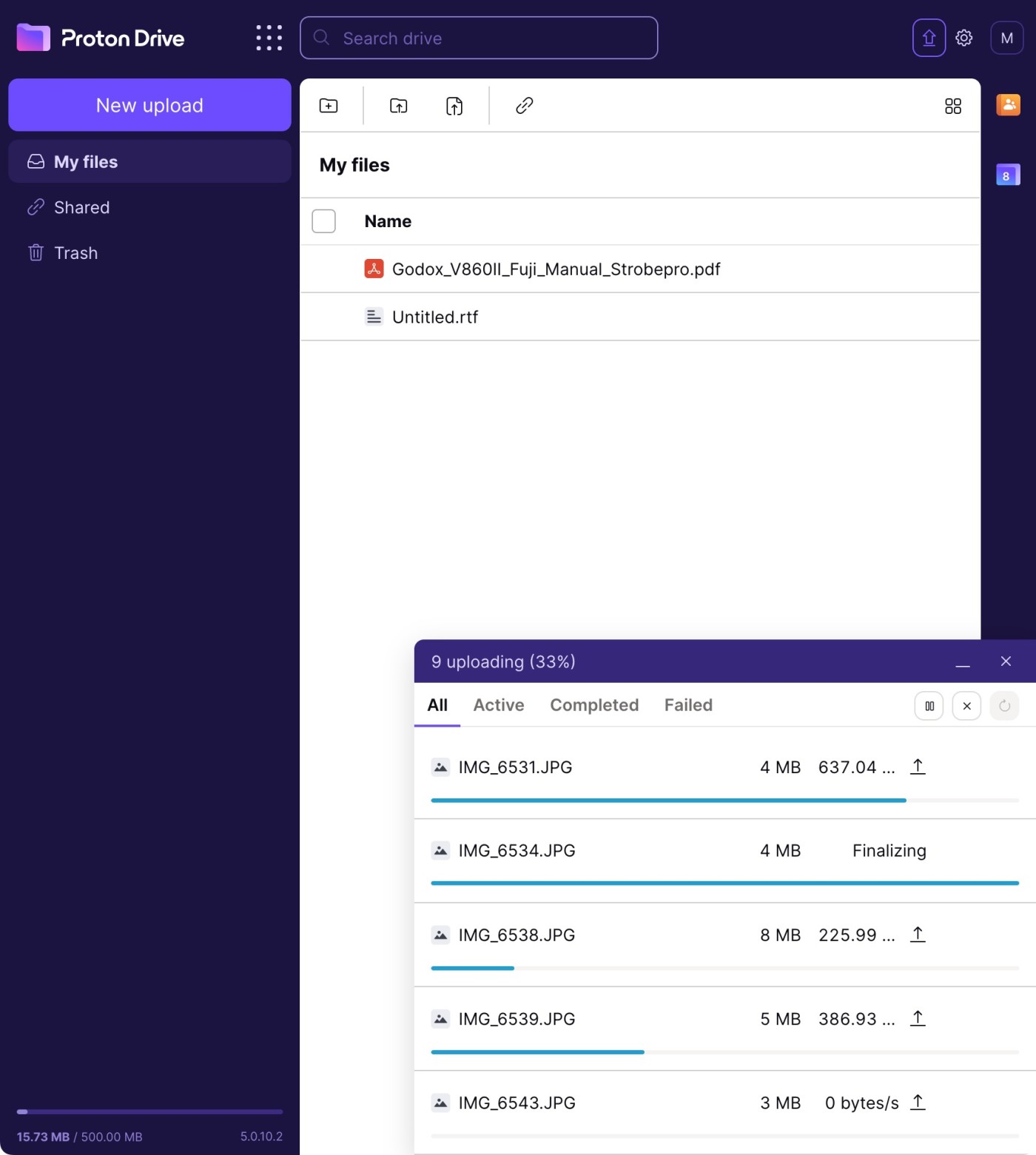
There are two types of security: the standard kind that prevents hacking attempts, and the kind where no one but you can access your files, known as zero-knowledge encryption. Proton Drive files are automatically "locked" by mathematical algorithms, and only your private key can open them. Proton can't access your stuff, no matter where you live, which may be important to you in light of the CLOUD Act mentioned above.
Besides secure storage, Proton offers a VPN to hide your IP and an end-to-end encrypted email client. Its paid plans aren't as competitive as others, but it provides great value with these additional privacy tools.
Proton strives to make top-notch encryption accessible for the average user. I consider myself techier-than-average, but encryption can be confusing, so I appreciate how easy Proton is to use. Adding my files was like using any other cloud storage app, with all the technical math-y stuff happening in the background.
One thing to note: Proton doesn't offer a dedicated Windows or Mac app. You can access Proton through a web browser, or with iOS or Android apps, but it's inconvenient compared to being able to work with your files directly on your computer. The trade-off for 100% privacy may be worth it for you. You can still download files for offline access.
Additionally, Proton is unique compared to other companies on this list as a mission-driven organization. Yes, they sell storage space for money, but according to Proton, they "exist to serve the world" and "make digital freedom a reality." In line with that, their software is open source and regularly audited by independent security experts worldwide. While I don't understand all the tech stuff, their transparency inspires a lot of trust.
With great privacy comes great responsibility… to not lose your private key. Since not even Proton can access your files, losing your private key means losing all your files forever. There's no "reset my password" or contacting customer service to log in. As long as you're sure you won't lose it, Proton is for you if you share their values of a private digital existence for everyone.
Proton pricing: Get 1GB for free. $4.99/month for 200GB or $11.99 for 500GB, which also comes with Proton Mail, Calendar, and VPN. Business plans also available.
Best cloud storage app for a robust alternative to Google Workspace
Zoho WorkDrive (Mac, Windows, iOS, Android)
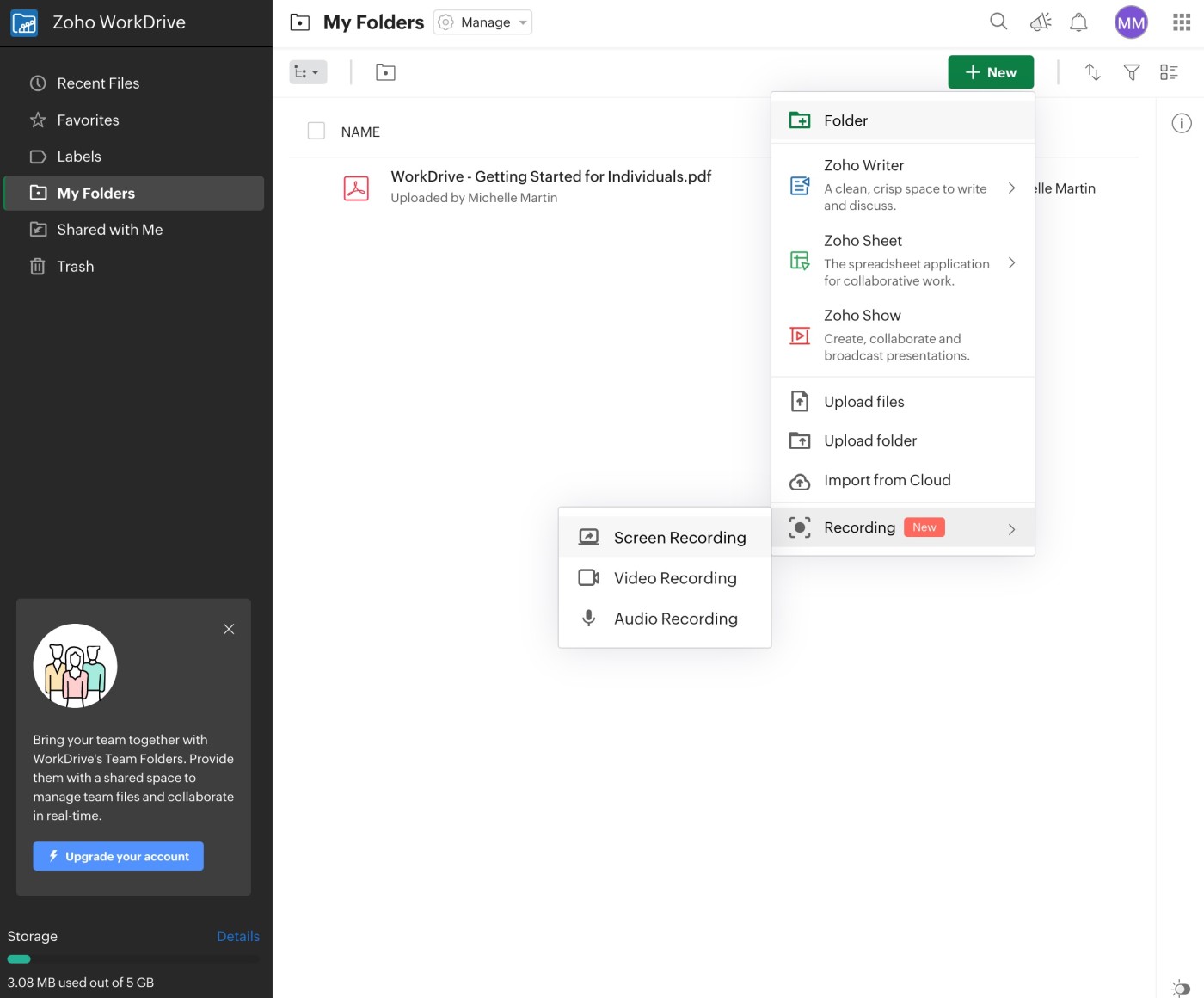
You know that kid who always had the latest designer clothes? And then you found out Granny did her holiday shopping on Canal Street? Zoho is kinda like that: it's trying really hard to be Google Workspace.
That's not a bad thing, but with over 45 separate apps to do everything from documents to email, meetings, and more… it's a lot. Zoho makes sense for freelancers or small teams wanting an extremely complete suite of apps to run a business, including features Google Workspace doesn't offer, like accounting.
For simple cloud storage, Zoho WorkDrive has all the basics—multi-device syncing, offline access, sharing, etc.—and includes built-in document and spreadsheet editing. Like Google Workspace, you can create new documents from the web, and Writer, Sheet, and Show (presentation) files are free to use and store.
Zoho WorkDrive packs a lot of powerful features into a somehow simultaneously easy and difficult app to use. I found it easy to add, create, share, and organize my files, but some tasks were unnecessarily complex.
For example, syncing: you can store files on your device for offline access or keep them in the cloud, like most other apps, but doing so requires installing two separate syncing apps: WorkDrive Sync for on-device file syncing, and WorkDrive TrueSync for "streaming" from the cloud. But wait, there's more! A third app: WorkDrive Genie. Available as a browser app for Windows or Mac, Genie opens a WorkDrive file in the app needed to edit it on your computer (e.g., Photoshop for .PSD), then automatically saves the new version back to the cloud. So like exactly what my computer already does by itself?
I (bitterly) tested all three apps, and yes, syncing, opening, and organizing files worked well in all. But the only app you really need is WorkDrive TrueSync to get your files on your computer and open them from Finder (Mac) or File Explorer (Windows). If downloading a separate "Genie" app to open files from a web browser is a productivity hack for you, I will pray for you.
Zoho offers impressive features, but the overcomplicated syncing process alone makes it a no for me. But if you have the patience of a saint and are looking for a Google Workspace alternative, Zoho WorkDrive is worth trying. It also integrates with Zapier, so you can do things like saving email attachments automatically or letting your team know when there's a new file.
Zoho WorkDrive pricing: Get 5GB for free. Paid plans range from $2.50/month/user for 1TB of team storage to $9/month/user for 5TB of team storage.
Best cloud storage app for automatic, unlimited photo storage
Jottacloud (Mac, Windows, iOS, Android, command line tool)
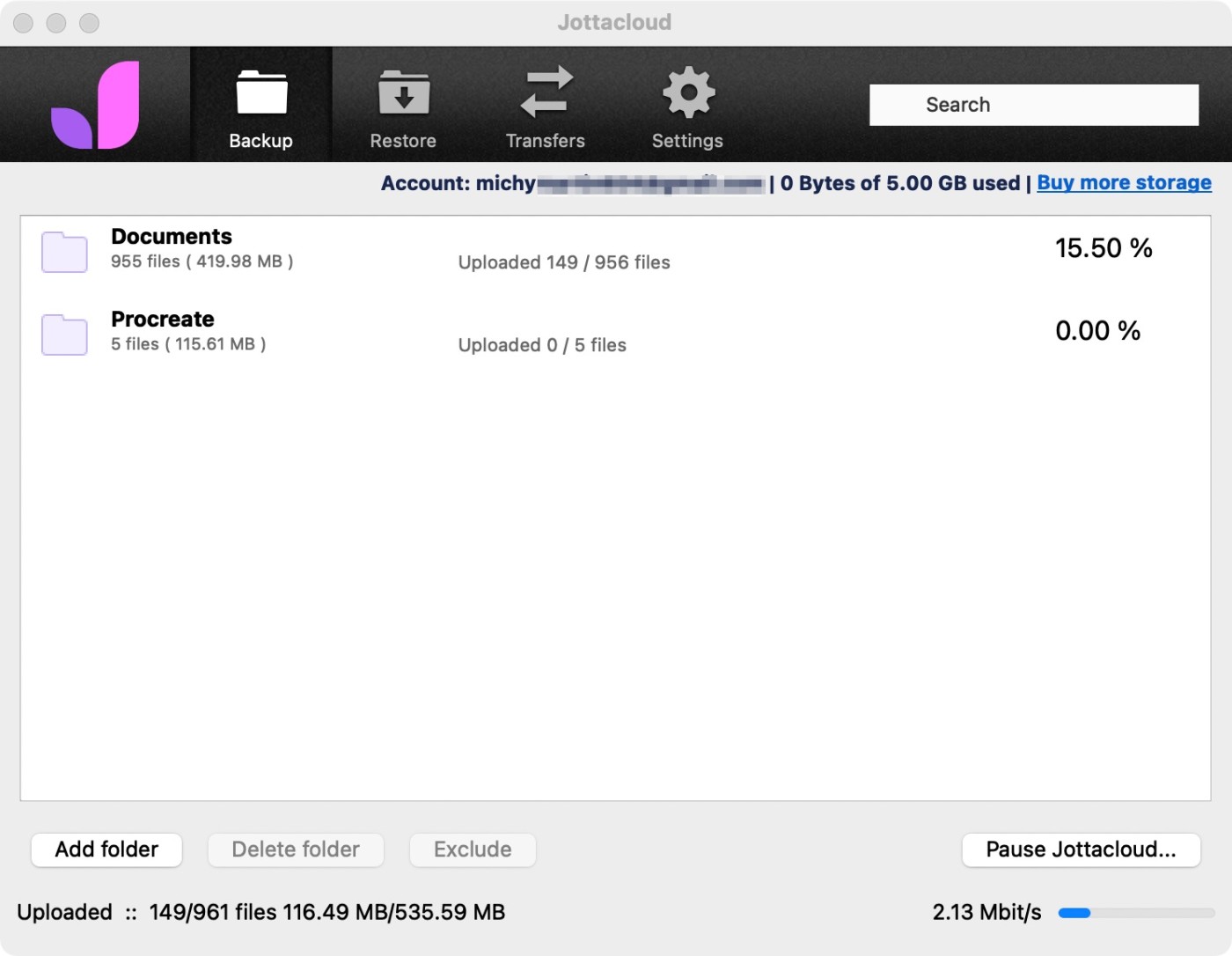
You can upload any kind of file to Jottacloud, but media organization is where it shines. Like Apple Photos and Google Photos, the Jottacloud mobile app can automatically back up your phone's photos and videos. You can clear uploaded media with one click, instantly freeing up device storage. The mobile app beautifully displays your memories in galleries, and you can stream media, including RAW files, to Apple TV and Chromecast.
Oh, did I mention unlimited storage is under $10 per month?
Besides easy media backup, you can store any type of file and choose what syncs to your device and what stays one-way in the cloud. Jottacloud can automatically back up any device, including external hard drives. You also don't have to worry about privacy as Jottacloud is fully Norwegian-owned and exempt from the CLOUD Act.
After testing it, I decided to switch to Jottacloud for backing up my NAS files, devices, phone photos, and computer. For me, that replaces Apple Photos, most of my iCloud and Google Drive storage needs, and my longtime computer backup tool, Backblaze. Jottacloud's affordable unlimited plan saves money by consolidating those needs, and I love the photo organization features.
If that isn't enough, you can also extend Jottacloud with Zapier integrations like this one.
Personally, I connected a Notion database I use for saving research, so any attached files automatically upload to my Jottacloud sync folder.
Jottacloud pricing: Get 5GB for free. Unlimited storage is €9.90/month for personal use. Family sharing plans (5 users) start at €6.90/month for 1TB and up, and business plans licensed for commercial use range from free (5GB) to €49/month for 1TB storage.
Best cloud storage app for managing multiple cloud storage providers
Koofr (Mac, Windows, Linux, iOS, Android, Huawei AppGallery, WebDAV, Rclone, Web)

Straight up: If you want to auto-backup a Huawei phone, Koofr is your app. For the rest of you, Koofr is best used as an overall cloud storage manager.
Koofr is unique in that it offers built-in storage—10GB on the free tier—and you can also connect other cloud storage apps, like Google Drive, Dropbox, or OneDrive. You can then manage files and search across all your cloud storage apps from the Koofr app on any device.
If you're as cheap as me, it's a great way to cobble together free plans from multiple apps into one tidy space. Crucially, you can connect multiple separate accounts for each third-party app. For example, split your work and personal files into two completely separate free Google Drive accounts.
Koofr's flexible, mix-and-match pricing plans allow you to add on "buckets" of different storage amounts and features, which is useful if you need higher transfer limits for one bucket, but not for the rest. Additional perks of paid plans include 30-day file recovery, unlimited file sharing, Microsoft Office online editing, and a PDF/image editor.
I admit: I didn't want to like combining my mish-mash of cloud storage providers in one spot. I thought it would be clunky, but the powerful cross-platform search is an unreal productivity boost.
Koofr pricing: Get 10GB for free. Plans start from €0.50/month for 10GB to €120/month for 20TB, and you can mix and match storage blocks and features to suit your needs.
Which cloud storage app should you use?
I focused on true cloud storage apps for this article, meaning you can store any type of file without having to keep them on your computer or main device. However, there are many great backup-only solutions out there, including popular options Backblaze, iDrive, and pCloud.
Additionally, there are many niche-specific cloud storage apps that are a better fit for certain people, such as CloudSpot for photographers and Filepass for musicians.
And then there's the question of: should you use cloud storage at all? The best defense against hacking is keeping your stuff offline, either on a private-network NAS server or hard drive. But since physical drives have an average annual failure rate of 1.46%, you still need a robust backup strategy, including multiple copies.
Wherever you decide to keep your stuff, incorporate security best practices into your digital routine for the best chances of keeping prying eyes out. Stay safe and sync on.
Related reading:
This article was originally published in June 2018 by Melanie Pinola and also had contributions from Maria Myre. The most recent update was in February 2023.
